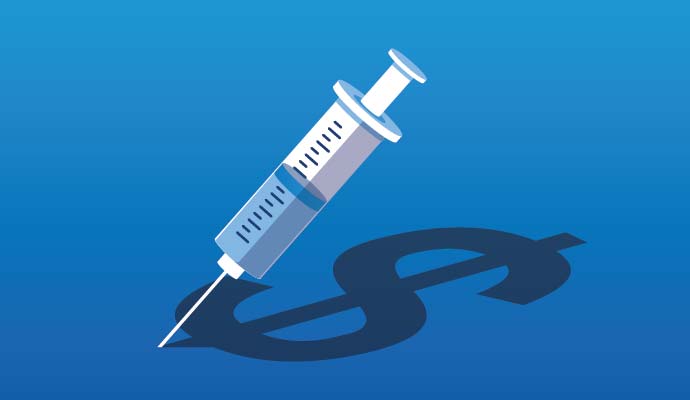Price for COVID-19 Treatment May Range from $10 to $4K, ICER Says
The alternative pricing models for remdesivir present prices based on two different paradigms, a cost recovery approach and a traditional cost-effective analysis.

Source: Thinkstock
- Using two different alternative pricing models, the Institute for Clinical and Economic Review (ICER) determined that the price for remdesivir could range from $10 to over $4,000.
For more coronavirus updates, visit our resource page, updated twice daily by Xtelligent Healthcare Media.
But according to the recent preliminary analysis, a higher transaction price for one ten-day course of remdesivir for severe COVID-19 patients would be necessary to achieve a profit over that of the cost to produce the next course of treatment.
Researchers leveraged the two models to estimate the cost-effectiveness and corresponding health-based price benchmarks of remdesivir versus standard care for hospitalized patients with severe COVID-19 and lung involvement.
From the manufacturing perspective, the lowest cost to recover the marginal cost to produce one 10-day course of antiviral remdesivir for COVID-19 patients is $10.
A higher transaction price for one ten-day course of remdesivir would be needed to gain a profit above another course of treatment cost.
“Policymakers and the public will need to debate the most appropriate development and pricing paradigms to be used to achieve rapid development and distribution of affordable treatments for a global pandemic,” researchers stated.
To uncover remdesivir cost recovery, researchers used evidence on the cost of producing from a study by Hill et al. in the Journal of Virus Eradication.
In the study, researchers estimated the minimum costs of production from the costs of active pharmaceutical ingredients using an established methodology with good predictive accuracy for medicines for hepatitis C and HIV amongst others.
Researchers took data from global export shipment records or analyses of the route of chemical synthesis. The estimated costs were compared with list prices from a range of countries where pricing data was available.
The costs of production for repurposed COVID-19 drugs ranged between $0.30 and $31 per treatment course, which was between ten and 28 days.
Specifically, minimum costs of production were US $0.93 a day for remdesivir.
In ICER’s analysis, researchers rounded the $0.93 amount up to $10 for a ten-day course. If a five-day course of treatment becomes a recommended course of therapy, then the marginal cost would accordingly shrink to $5.
Researchers stated that in their cost recovery calculation, the cost for research and development (R&D) was set to zero, as some R&D costs should not be used to help justify the price of new drugs. Remdesivir was previously successful on the market as a suite of agents for chronic Hepatitis C.
“We are not currently including any research and development costs separate from the development costs already captured in the cost of production. As the manufacturer spends new money going forward on clinical trials for the COVID-19 population, consideration will be given to including these costs as a possible component of a cost recovery price estimate,” researchers said.
In the second ICER-COVID model, researchers used a decision tree model that had evidence from the Adaptive COVID-19 Treatment Trial (ACTT) to estimate the costs and quality-adjusted life years (QALYs) gained through hospital recovery or death.
Then, they estimated the costs and outcomes of remdesivir and standard of care by assigning the age-based average survival, health care costs, and utility for all those who recovered from the COVID-19 hospital event, ICER stated.
But there is uncertainty around remdesivir clinical evidence and the comparative remdesivir mortality benefit in the ACTT study did not reach benefit, according to researchers.
“The mortality benefit is by far the largest driver of the cost-effectiveness findings. To address this uncertainty, we performed a scenario analysis assuming no mortality benefit for remdesivir,” researchers said.
In the preliminary model, remdesivir extended life and improved quality of life versus standard of care. The ICER-COVID model suggested a price of approximately $4,500 per treatment course, whether that course is ten or five days.
Additional cost-effective results will be released as further data is found and as the context for the patient population receiving treatment becomes more evident.
“Cost-effectiveness modeling is but one of several approaches to consider reasonable pricing. Particularly in the setting of a public health emergency on the scale of that associated with COVID-19, public and policymakers should consider a broad range of approaches,” researchers concluded.
